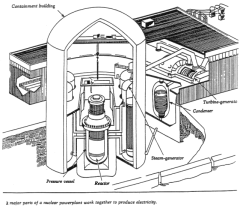 I just read Brian Dunning's post about the Fukushima explosion and was about to comment there but they are blocking comments from behind proxies, which is incredibly stupid on their part. So there, new post.
I just read Brian Dunning's post about the Fukushima explosion and was about to comment there but they are blocking comments from behind proxies, which is incredibly stupid on their part. So there, new post.
Dunning is a strong supporter of nuclear energy, which is fine. I used to be fiercely in that camp until fairly recently, based on scientific facts about our current technical ability to build secure plants and about the danger that other traditional energies present in a much more real way (look up the death toll for coal to see what I mean).
What made me change my mind is the realization that nuclear energy is surrounded by an opaque cloud of secret, all over the world. This is essentially a world where no transparency exists at all. We know very well what happens when there is no transparency: people cut corners and get away with it. In the case of nuclear energy, cutting corners is particularly tragic.
Another reason to be rationally against nuclear energy today of course is also that we should focus our efforts instead on making renewable energies viable.
Dunning, in his post, argues that coal is much more dangerous than nuclear energy. That's a feeble argument: we should also get rid of coal, starting now. One does not preclude the other, we can do both.
The Fukushima accident, even though not the final proof of the horribleness of nuclear energy in principle, should give us pause, and stimulate debate. What is the state of currently running plants? What should we replace them with at the end of their lifetimes? Did we tragically underestimate natural catastrophe risks for some of those plants? And also, very importantly, how do we reach transparency on nuclear energy and waste disposal? Those, I think, are questions worth asking.